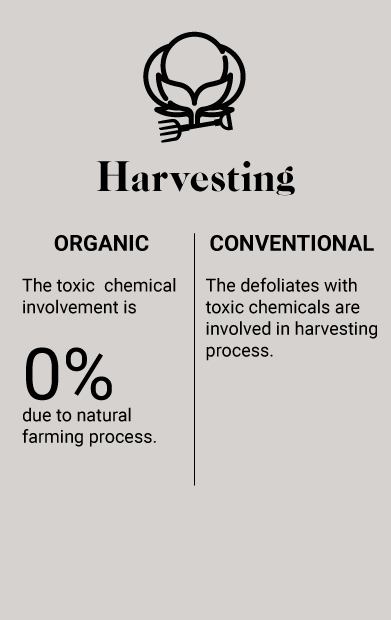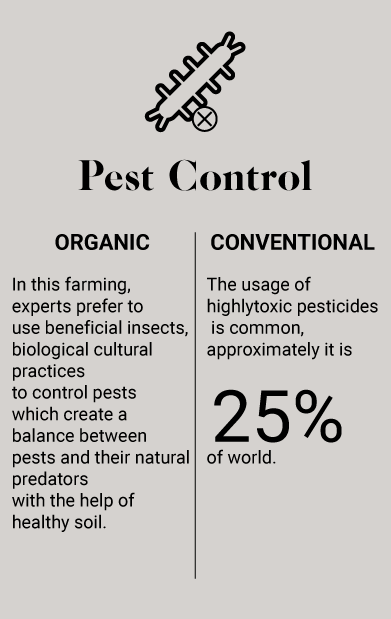Comparison between Organic & Conventional Cotton

You will be surprised to know that there is a big difference between organic and conventional cotton.
| Although, we are familiar with the reality that cotton is a natural fiber. Unfortunately, this point is not enough to make it organic and sustainable. In this fast era, people consider it a normal thing to add chemicals in their daily routine life for example food, clothing, accessories, even into the bedding material which they use on laying. |
| But like the rise of organic cotton, the natural organics have their own worth that is still being produced without the use of any toxic chemicals or harsh dyes in bedding sheets and pillowcases. To fully understand the difference between both types of cotton materials, let’s start by telling a bit more about each of them. The main difference between organic and conventional grown cotton is the farming methods used. |
Conventional cotton is produced by using two ways.




1): Dryland or 2): irrigated. In 1st part of Dryland, this crop relies on natural rainfall, especially in the summer season, and in irrigated method, it is fed by water pumped from rivers or the underground sources if available. According to the Water Footprint Network (WFN), almost 53% of the world's cotton crop is irrigated which accounts for about 73% of the total production of the crops in the world. It means, 10,000 liters on average to produce one kilogram of cotton that significant environmental challenge," the ITC (International Trade Centre) notes if the drainage does not manage carefully, it can increase the risk of pollution of surface and groundwater.
 On the other hand, the cultivation of organic cotton is usually done without any use of synthetic pesticides, chemical fertilizers, and artificial irrigation processes It's only produced with the natural fertilization process and rainfall. Due to the natural fertilizing process, the quality of the soil is controlled by crop rotation that is environment friendly.
On the other hand, the cultivation of organic cotton is usually done without any use of synthetic pesticides, chemical fertilizers, and artificial irrigation processes It's only produced with the natural fertilization process and rainfall. Due to the natural fertilizing process, the quality of the soil is controlled by crop rotation that is environment friendly.
The production of organic cotton in this way is clean and safe and creates a sustainable agricultural cycle. It promotes biodiversity. Nowadays organic cotton is certainly more require which has become a rare product, making up less than 1% of global cotton production. Before buying any bedding sheet material or Pillowcases, make sure that it has made with organic cotton material that can be found GOTS symbol or their tags on the packaging. Because “Organic Cotton Initiative” is the joint initiative campaign between the Soil Association (GOTS) Global Organic Textile Standard.
The organic cotton production process is always without the induction of harmful chemicals that can be feel with its soft touch and more breathable texture. The textile brands who claim that their products are best in use, fully organic, and have the GOTS symbol, must be made with at least 95% certified organic fibers. But in actual, these products call themselves “made with organic", are only produced 70% certified organic fibers.
Sleepworldintl is a leading textile industry where you can find GOTS-certified bedding sheets made with 100% organic cotton. We have tried to fulfill our promise year after year to deliver the best quality fabric material in form of bedding sheets, crib sheets sets, Duvet covers sets, and so on.
Sleepworldintl make it possible to provide our customers a high-quality fabric material for which, we keenly observe the complete process from harvesting to each step of manufacturing because we want that we may gain your trust. We deliver GOTS certified organic cotton fiber material sheets and staples, that are woven into silky yet durable, soft in feel and more comfortable with every wash. So you can buy it confidently.
So after reading this detailed note you will agree that organic cotton is not only better than conventional but it is actually our future if we are serious about making big changes in our health and as well as for the families, our communities, and our planet. So let’s move with organic cotton use.


